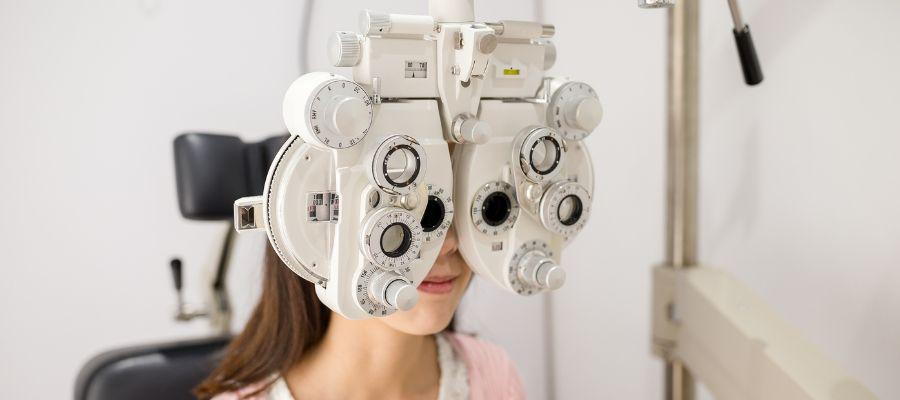
What Is The Difference Between A Vision Screening And A Comprehensive Eye Exam?
You might have heard of vision screenings and comprehensive eye exams, but you're not quite sure what distinguishes one from the other. Fret not, for this article is set to dispel your confusion and clarify the difference in detail. Let's start the conversation by heading to one of the two Pensacola locations of Fifty Dollar Eye Guy, where Dr. Joseph Tegenkamp offers both services with a hearty smile. With their commitment to exceptional customer service, personalized care, high-quality eyewear selection, and top-notch vision care, you'll not only get your vision checked out but also have a comfortable and enjoyable experience.
Understanding Vision Screening
Definition of Vision Screening
Vision screening is a preliminary test that identifies potential vision problems or eye abnormalities. It is not as in-depth as an eye examination, but it serves as an alert mechanism, signaling that you may need a more comprehensive diagnosis or treatment.
Who performs Vision Screenings?
Healthcare professionals such as pediatricians, general practitioners, school health staff, and sometimes even volunteers at health fairs can perform vision screenings. These individuals should be properly trained to administer the test to ensure accurate results.
Typical processes involved in Vision Screening
Vision screening usually involves a series of quick, simple tests to check your visual acuity and eye function. These may include a visual acuity test, where you read letters from a distance to measure how well you can see, and the cover test, where one of your eyes is covered to see how the other eye responds. It's a straightforward procedure that generally doesn't take much time.
Conditions detected through Vision Screening
Common conditions that can be detected through a vision screening include nearsightedness or farsightedness, irregular vision balance between the eyes, and eye misalignment. However, it's important to remember that vision screenings do not provide a diagnosis. If a potential issue is detected, you will be referred for a comprehensive eye exam.
Role of Vision Screening in Eye Health
Importance of Vision Screening
Vision screening is vital as it serves as the first line of defense against potential eye problems. It is especially significant for children as early detection and correction of vision issues can significantly impact their academic and social development.
Frequency of Vision Screenings
Although the frequency may differ based on various factors like age, health condition, and risk factors, it's generally recommended to undergo vision screening once every one to two years. Always check with your healthcare provider to understand what's best for your situation.
Impact of ignoring Vision Screenings
Ignoring regular vision screenings can lead to undetected and untreated vision problems that may affect your daily life activities and could lead to severe long-term implications such as vision loss.
Limitations of Vision Screenings
What Vision Screenings do not cover
While vision screenings are an excellent preventive measure, they do not replace a comprehensive eye exam. Vision screenings cannot diagnose conditions such as glaucoma, macular degeneration, or cataracts. Neither can it provide a precise measurement for corrective lenses if you need them.
Possible misconceptions about Vision Screenings
One possible misconception is that passing a vision screening means your eyes are perfectly healthy. However, as mentioned earlier, vision screenings only check for specific basic visual efficiency and not any underlying eye diseases.
Risks of solely relying on Vision Screenings
Solely relying on vision screenings can lead to delayed diagnosis and treatment of some eye conditions as these screenings do not cover all aspects of eye health. Hence, even if you pass a vision screening, it is still crucial to undergo a comprehensive eye exam regularly.
Understanding a Comprehensive Eye Exam
Definition of a Comprehensive Eye Exam
A comprehensive eye exam is a thorough evaluation of your eyes including visual acuity tests, binocular vision testing, color vision testing, glaucoma screening, and in-depth examination of the various parts of your eye.
Who performs Comprehensive Eye Exams?
A licensed optometrist or ophthalmologist usually performs comprehensive eye exams. These eye care professionals have extensive knowledge about the structure, function, and diseases of the eye.
Typical processes involved in a Comprehensive Eye Exam
A comprehensive eye exam involves several procedures. These range from basic visual acuity tests to more complex tests such as retinal examination, ocular motility testing, slit lamp examination, and intraocular pressure measurement. The examination is designed to evaluate not only your vision but also the health of your eyes.
Conditions detected through Comprehensive Eye Exams
Comprehensive eye exams can detect a wide range of conditions that may not be detected through a vision screening. Some of these include glaucoma, cataracts, macular degeneration, diabetic retinopathy, and many others.
Role of a Comprehensive Eye Exam in Eye Health
Importance of a Comprehensive Eye Exam
A comprehensive eye exam is crucial to maintaining good eye health as it allows for early detection and treatment of eye diseases. Early diagnosis often makes treatment more effective.
Frequency of Comprehensive Eye Exams
It's generally suggested to have a comprehensive eye exam every one to two years. However, if you have a high risk of eye diseases or have experienced vision changes, more frequent exams may be recommended.
Impact of ignoring Comprehensive Eye Exams
Ignoring regular comprehensive eye exams can lead to undetected and untreated eye diseases, many of which can cause irreversible damage if neglected.
Key Differences Between a Vision Screening and a Comprehensive Eye Exam
Depth of Examination
While vision screenings provide a general overview of your eye health, comprehensive eye exams delve much deeper into assessing your eyes. They are designed to diagnose and treat conditions that may not be identified during a screening.
Types of Conditions Detected
Vision screenings primarily identify refractive errors and visible eye abnormalities, whereas comprehensive eye exams can diagnose a wide range of conditions that include vision problems, eye diseases, and other health issues often reflected in the eye.
Time and Cost
Typically, vision screenings take less time and are often offered for free or at low cost. Comprehensive eye exams, on the other hand, are more time-consuming and costly due to their thorough nature and the use of specialized equipment.
Follow-up Procedures
In case of abnormal results, vision screenings prompt for a comprehensive eye exam for diagnosis, while a comprehensive eye exam leads to treatment plans for identified conditions or diseases.
Choosing between Vision Screening and Comprehensive Eye Exam
When to opt for Vision Screening
Vision screenings can be a good starting point if you have no known eye problems and only need a basic check-up of your vision.
When to opt for a Comprehensive Eye Exam
If you're experiencing any vision problems, have a family history of eye diseases, or it's been a while since your last eye exam, you should opt for a comprehensive eye exam.
Understanding your Eye health needs
Your choice between a vision screening and a comprehensive eye exam should be guided by your individual eye health needs and risk factors for eye disease. Always consult with your healthcare provider to make an informed decision.
How to Prepare for a Comprehensive Eye Exam
What to bring
When preparing for a comprehensive eye exam, remember to bring your current prescription glasses, a list of medications you take, and any questions or concerns you have about your eyes or vision.
What to expect
Expect to have your vision tested and eyes dilated. Various tests will be done to check the health of your eyes. This can take an hour or more, so plan your schedule accordingly.
How to choose a trusted optometrist
Ensure your optometrist is licensed and has a good reputation. Ask friends and family for recommendations or read online reviews.
Recommendations for Eye Care Assistance
Promoting 50 Dollar Eye Guy
For comprehensive eye care, we recommend 50 Dollar Eye Guy available at the two locations in Pensacola, FL. Providing a wide array of services, they ensure that you get the best care for your eyes.
Discussing Dr. Joseph Tegenkamp's Expertise
At 50 Dollar Eye Guy, you'll be under the excellent care of Dr. Joseph Tegenkamp, a friendly and professional eye care provider who is passionate about providing high-quality care to his patients.
Services Offered at 50 Dollar Eye Guy
On top of comprehensive eye exams, 50 Dollar Eye Guy offers a large selection of fashionable eyewear, ensuring you not only get the best vision care but also look your best.
Frequently Asked Questions about Vision Screenings and Comprehensive Eye Exams
Addressing common concerns
Don't hesitate to ask your optometrist any questions you may have about the process or outcomes of your vision screening or comprehensive eye exam. It's important that you fully understand the condition of your eyes and the steps you can take to maintain or improve your eye health.
Clarifying misconceptions
Always verify information about eye health with a trusted professional. Keep in mind that while vision screenings are helpful, they are not a substitute for comprehensive eye exams.
Tips for maintaining good eye health
Regular eye exams, a balanced diet, protective eyewear, and quitting smoking are some ways to maintain good eye health. If you notice any changes in your vision, seek medical attention right away.





